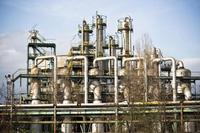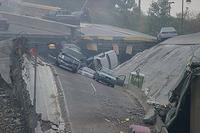-
Insurance industry paying increasing attention to climate change-related risks

The insurance industry, the world’s largest business with $4.6 trillion in revenues, is making larger efforts to manage climate change-related risks, according to a new study; weather- and climate-related insurance losses today average $50 billion a year; these losses have more than doubled each decade since the 1980s, adjusted for inflation
-
-
The costs, benefits, and efficiency of aviation security measures
The threat of terrorist attack on American aviation has made the system the focus of intense security efforts, but it is difficult to determine if the benefits outweigh their cost; efficient security policy — a focus on getting the most security for the least cost — should be the priority in an era of fiscal austerity, says a new RAND report
-
-
Under industry pressure, DHS drops chemical plant employee screening proposal

Security experts agree that short of a nuclear attack on a U.S. city, the most casualty-heavy disaster would occur as a result of an accident in, or a terrorist attack on, a chemical plant which would release a cloud of toxic fumes; there are about 15,000 plants in the United States which produce, process, use, or store volatile and toxic chemicals; more than 300 of the these plants are so close to large population centers, that a chemical release in any one of them would cause more than 50,000 casualties; DHS wanted to have employees in these plants screened for potential ties terrorism, but the chemical industry objected, saying this would be too costly; last Thursday DHS pulled the proposal
-
-
New, affordable instant warnings of bridge collapse

The Federal Bureau of Transportation lists nearly 70,000 U.S. bridges as “structurally deficient,” requiring extra surveillance; in addition, more than 77,000 others are categorized as “obsolete” — exceeding their intended lifespan and carrying loads greater than they were designed to handle; researchers developed a new technology for monitoring these 150,000 aging U.S. highway bridges
-
-
Crowd dynamics explains disaster at cultural, sports events
Physicists investigating a recent crowd disaster in Germany found that one of the key causes was that at some point the crowd dynamics turned turbulent, akin to behavior found in unstable fluid flows
-
-
Hurricane Ike damage analysis point to vulnerable Texas bridges
Preliminary results from a new research show more than a dozen Gulf Coast bridges on or near Galveston Island would likely suffer severe damage if subjected to a hurricane with a similar landfall as Hurricane Ike but with 30 percent stronger winds
-
-
Solar storms and infrastructure vulnerabilities

Space weather, and in particular coronal mass ejections, can cause huge disruption to many highly technological systems on Earth; experts say that vulnerable industries, such as power grids and airlines, should gather more information on space weather in order to make more informed decisions about how to deal with future solar storms
-
-
Scale of 2011 disasters challenged established thinking on nature of risk
New paper says that the scale of the catastrophes experienced in 2011 exceeded previous loss-modeling predictions and has challenged established thinking on the nature of risk; the paper says that, post-2011, companies need to re-examine their risk management strategies and introduce new methodologies to strengthen their operational and financial resilience
-
-
Companies team up to develop carbon capturing
Three companies have teamed up to build a low-carbon, coal-based power plant in Scotland; the plant will include a carbon-capture and storage; with more than 90 percent carbon capture, the coal feedstock plant will generate extremely low-carbon electric power and also produce hydrogen gas for commercial use
-
-
Japan questions earthquake forecasts
Following the massive 11 March earthquake and tsunami that rocked Japan, residents and experts there have grown increasingly skeptical of quake forecasts
-
-
Japan considers referendum to end nuclear power
Lawmakers in Osaka, Japan are currently mulling over whether to abandon nuclear power all together following the catastrophic nuclear accident at the Fukushima Daiichi atomic energy plant
-
-
Ex. Special Forces officers launch India-based threat detection company
TigerSwan and its joint venture partners, Kaizen Technologies and Santa Monica Financial have formed TigerSwan Vulnerability Management Services Private LTD, based in Mumbai
-
- « first
- ‹ previous
- 1
- 2
- 3
- 4
